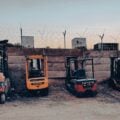Vinyl is the material that makes up the vast majority of our truck tarp inventory. But Mytee Products also carries a selection of canvas tarps as well. We understand that canvas tarps are tough tarps, and sometimes drivers need that extra toughness. There are times when vinyl will just not do.

This post will explore just why canvas is such a tough material and what that means to truck drivers. So let’s start by first discussing the difference between plain and duck canvas. They may look the same to the naked eye, but they are distinctly different products.
A standard canvas tarp is made from a fabric constructed of heavy fibers (usually cotton) woven together in a plain weave. The weave is tight enough to be water-resistant and reasonably tough under most circumstances. Duck canvas uses a similar weave, but the density is greater. The advantage of duck canvas is that the tighter weave makes it more resistant to weather. The downside is that it is not as breathable.
Both types of canvas can be treated with wax to make them waterproof. This is obviously not necessary to protect the fabric itself, but it is a big plus for truckers who need to keep moisture out. Waxed canvas tarps do need to be retreated every now and again.
Why Canvas Is So Tough
The toughness of canvas is really a matter of physics. To understand this, first ask yourself what it is that causes damage to truck tarps. Usually it is things like sharp edges, airborne debris, and weather. All these things exert force on the tarp fabric that can lead to rips, tears, etc.
Resisting damage is a matter of resisting those external forces. What makes canvas so tough is the weave. By using a high concentration of fibers woven together in an over and under pattern (this is the plain weave pattern), canvas makers are creating a surface that absorbs energy and dissipates it across its entire surface. Each one of those little fibers handles some of the energy directed at the surface of the tarp. The more fibers there are, the more effectively energy is absorbed and dissipated.
As for the weave, it allows energy absorbed in one portion of the tarp to be transferred across the entire surface by way of the fibers touching one another. Furthermore, each fiber supports the ones around it through the over and under contact of the weave. When external force is exerted on the fabric, the fibers that initially absorb it are supported by the surrounding fibers even as the energy begins to dissipate across the entire surface of the tarp.
Life after Trucking
If you have ever wondered just how tough canvas is, consider what might happen to your tarps after they are no longer usable for trucking. Canvas tarps can be recycled and used to create all sorts of things. For example, there is a company in Europe that recycles rubberized canvas truck tarps by turning them into full size travel cases.
The tarps are cleaned, cut into smaller pieces, and sewn together into large travel bags with inflatable frames made out of bicycle tubes. Using canvas as the main material allows for rolling the bag up into a fairly compact package when not in use. When unrolled and inflated, the combination of bike tube and canvas creates a durable, water tight suitcase that rivals any hard-shell product on the market.
We love canvas tarps because they are tough tarps. If you need one or two to fill out your inventory, Mytee Products has what you need.










